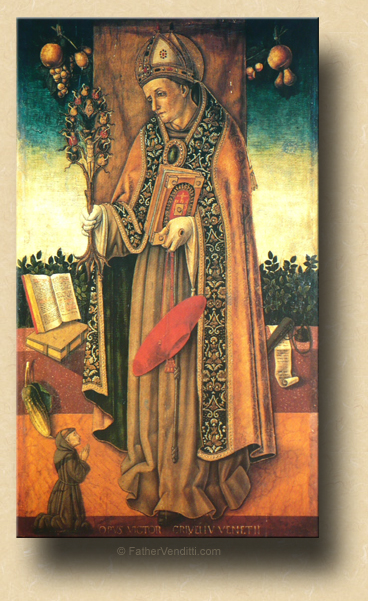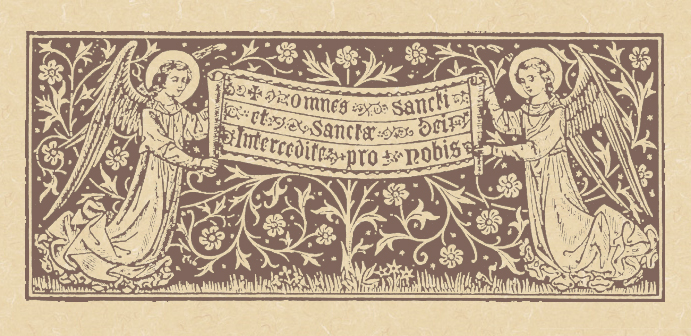The Patron Saint of Those who Have to Put Up with Nonsense.
The Memorial of Saint Bonaventure, Bishop & Doctor of the Church.
Lessons from the secondary feria, according to the ordinary form of the Roman Rite:
• Isaiah 38: 1-6, 21-22, 7-8.
• [Responsorial] Isaiah 38: 10-12, 15.
• Matthew 12: 1-8.
The Third Class Feast of Saint Henry, Emperor & Confessor.*
Lessons from the common "Os justi…" of a Confessor not a Bishop, according to the extraordinary form of the Roman Rite:
• Ecclesiasticus 31: 8-11.
• Psalm 91: 13-14, 3.
• Luke 12: 35-40.
In the Ruthenian recension:
The Feast of the Holy Great Prince Vladimir, Equal to the Apostles.**
Lessons from the menaion, according to the Ruthenian recension of the Byzantine Rite:
• Galatians 1: 11-19.
• John 10: 1-9.
|
Outside the Ruthenian recension:
The Eighth Friday after Pentecost; the Feast of the Holy Martyrs Cyricus & Julitta; and, the Feast of the Holy Great Prince Vladimir, Equal to the Apostles.
First & third lessons from the pentecostarion, second & fourth from the menaion, according to the Greek recension of the Byzantine Rite:
• I Corinthians 14: 26-40.
• I Corinthians 13: 11—14: 5.
• Matthew 21: 12-14, 17-20.
• Luke 10: 19-21.
|
FatherVenditti.com
|
 9:30 AM 7/15/2016 — The texts for today's Mass may seem like a jumble of contradictions; and, on a few occasions the last couple of weeks I was perhaps pushing the envelop to manufacture a unity among them. In reality, the readings for the day have no relationship to the cycle of the saints, and we were fortunate a few times in the last few weeks to be able to find one accidentally, such as in the case of the memorial of the Chinese martyrs. Today, however, the Missal throws us a bone. 9:30 AM 7/15/2016 — The texts for today's Mass may seem like a jumble of contradictions; and, on a few occasions the last couple of weeks I was perhaps pushing the envelop to manufacture a unity among them. In reality, the readings for the day have no relationship to the cycle of the saints, and we were fortunate a few times in the last few weeks to be able to find one accidentally, such as in the case of the memorial of the Chinese martyrs. Today, however, the Missal throws us a bone.
Our first lesson is the one I referenced on Sunday at our first annual White Mass, in which the Prophet Isaiah is sent to King Hezekiah, who is mortally ill, to tell him that he's about to die (cf. Isaiah 38: 1-22). To repeat, for those who weren’t here: Hezekiah is, of course, very distressed at this news, and begins to pray for his life to be spared; and, the Lord, having heard this prayer, sends Isaiah back to him to tell him that, because of the sincerity of his prayers, he will be allowed to live another fifteen years.
Now, theologically, we don't accept the notion that the mind of God, in His infinite wisdom, is changeable, but we do accept the notion that God will allow us to believe He's changed His mind in order to impress upon us the fact that He does hear our prayers, even when the answer we receive is not the one we want. God knew all along that He was going to save Hezekiah's life, but He didn't let Hezekiah know that. Hezekiah needed to be taken down a peg first; he needed to be forced to realize his dependency on God alone; so, God allowed him to believe that he was going to die.
The Gospel lesson is simply the familiar one of our Lord reminding the Pharisees that obedience to the Law is for a purpose, and that purpose is not the Law itself.
Both readings dovetail with the life of the Seraphic Doctor, the title that Pope Sixtus V gave him after his predecessor, Sixtus IV, canonized him. But Saint Bonaventure was a contradiction himself in a sense: we don't typically associate the Franciscan Order with men of great learning;—although we did notice;—you may recall—that Father Serra was a brilliant scholar before being sent to America—but, Bonaventure may have been the most brilliant man of the Middle Ages next to Saint Thomas Aquinas, of whom he was a contemporary. They taught together, in fact, at the University of Paris in spite of the fact that they were both Italians.
He was born in Tuscany, entered the Franciscans at an early age, was known for not only his learning but also for his profound devotion to the Passion of Our Lord. At the age of thirty-five he was elected Minister General of the Franciscan Order, and became known for his diplomacy and prudence. Pope Gregory X pulled him out of his order and made him a Cardinal, sending him to the town of Albano as its bishop, and it was in that capacity that he went to Lyons to participate in the Council there, but died while there at the age of forty-three.
It all sounds very serene, but there are aspects of his life that are not generally known, and which caused some consternation when Sixtus IV canonized him. He was elected Minister General of the Franciscans in 1257, at a time when the Franciscans were just beginning to become fragmented. Now days, we're familiar with all the various branches of the Franciscan Order: the Friars Minor, the Capuchins, the Conventuals, not to mention the plethora of more modern groups that have sprouted off from the Franciscan family or have simply adopted there own version of the Rule of St. Francis and attached his name to themselves; but, at the time, the Franciscans were still one group, but were just beginning to have all these internal dissensions within themselves. Bonaventure dealt with all this in a very heavy-handed way. The chief disagreement within the Order was between one group who wanted to embrace a very strict and severe interpretation of Franciscan poverty, and those who thought that the Order needed to change with the times in order to survive, and both groups claimed support for their respective positions by citing their own versions of the life of Saint Francis, the actual facts of which are sketchy at best.
In 1260, Bonaventure composed his own version of the life of Saint Francis, and commanded that all other biographies of Francis of Assisi be destroyed, and its from that work that most of what we believe about Saint Francis is known. Where he got most of his information about the life of Saint Francis no one knows, but those who felt he was not on their side accused him of simply making most of it up to support his own idea of what he wanted the Franciscan Order to become. In any case, he convened a General Chapter of the Order in 1263, and imposed a rather ridged uniformity among the Franciscans; and, while Bonaventure's reforms held the Order together for a while, ultimately it did disintegrate, which is why we have so many different Franciscan communities today.
When you set yourself to study the lives of the saints—not the homogenized, pious versions of their lives, but the real lives of the saints with all the nastiness included—you realize what a tremendous capacity these people had for maintaining their spiritual equilibrium amidst all kinds of chaos and unpleasantness. It harkens back to what we were discussing on the Solemnity of Saints Peter & Paul. The Church is of Divine origin, but Christ entrusted her to men, and those men are beset by a fallen nature, which means that the Church is not always going to be governed the way it should be. What distinguishes the saints from the rest of us is their ability to—simply put—not allow themselves to be bothered by it. It doesn't mean that a saint is complacent; quite the contrary, as evidenced by Saint Bonaventure's work to reform the Franciscans the best way he knew how. But at no time during all the controversies that he was forced to endure as Minister General of the Order did Bonaventure ever loose his holiness; and, we have to presume that his profound devotion to the Passion of Our Lord allowed him to see, in all he had to put up with, a participation in the Cross of Christ.
When Bonaventure looked at what was happening to his order he had to have the same feelings our Blessed Lord had when he found Himself having to rebuke the Pharisees on a point of spirituality that should have been obvious to them. He said what he said to them because he wanted them to change. I don't have to tell you that all of us, in whatever is our state in life, have to put up with all kinds of nonsense every day. But, if we would be saints, which all of us are called to be, we should know instinctively how to put it all in perspective. And when we kneel here before the Altar, and cast our eyes upon the Body of Christ, we know that, no matter what may be going on in our lives, Christ is always there, and he is always the same.

* Henry, Duke of Bavaria and Emperor of Germany, used his power to extend the kingdom of God. By mutual agreement, he and his wife preserved their virginity in marriage. He died in 1024.
** Vladimir Sviatoslavich the Great, Prince of Kiev, was the founder of the Russian Empire. After the death of his father in 972, Vladimir, who was then prince of Novgorod, was forced to flee to Scandinavia in 976 after his brother, Yaropolk, had murdered his other brother, Oleg, and conquered Rus. In Sweden, with the help of his relative Ladejarl Håkon Sigurdsson, ruler of Norway, he assembled a Varangian army and reconquered Novgorod from Yaropolk. By 980, Vladimir had consolidated the Kievan realm from modern-day Ukraine to the Baltic Sea, and had solidified the frontiers against incursions of Bulgarian, Baltic, and eastern nomads. Originally a follower of Slavic paganism, Vladimir converted to Christianity in 988, taking the baptismal name Basil, and thus Christianized the Kievan Rus.
The Churches of the Ruthenian recension (Russian, Ruthenian proper and Ukrainian, a.k.a. the Slavic Churches), because of their common Russian origins, celebrate his feast in a solitary way today, transfering the feast of the martyrs to yesterday. Outside the Ruthenian recension, his feast is celebrated along with the feria and the feast of the martyrs Cyricus & Julitta; the lessons from the menaion are then for the martyrs, there being no lessons for Vladimir.
|

